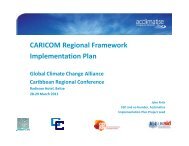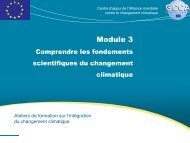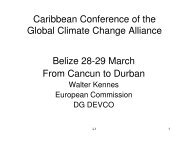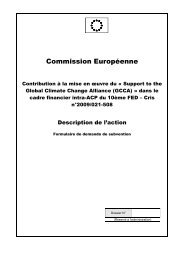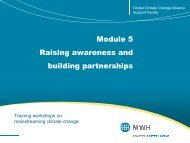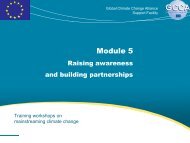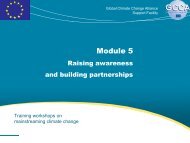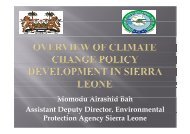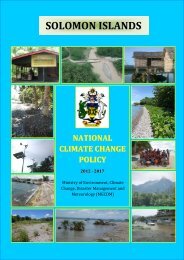Rwanda Green Growth Strategy 18nov11 - Global Climate Change ...
Rwanda Green Growth Strategy 18nov11 - Global Climate Change ...
Rwanda Green Growth Strategy 18nov11 - Global Climate Change ...
You also want an ePaper? Increase the reach of your titles
YUMPU automatically turns print PDFs into web optimized ePapers that Google loves.
Chapter 6Health Infectious human diseases continue to present a significant burden to our public health. Infectiousdiseases of livestock affect their health and welfare, are themselves important causes of human diseaseand can threaten food security. These effects occur worldwide, but are disproportionately prevalent in thedeveloping world. A large, but currently unknown, proportion of human and livestock pathogens isinfluenced by weather or climate and therefore climate change is likely to impact on some of them, possiblyexposing human or animal populations to new disease risks. Some diseases may spread but others mayretreat in distribution or intensity. The most notable impact of climate change is that higher temperaturespermit diseases to occur at higher altitudes. If climate change increases the burden of diseases that areexisting major health issues, then we may face exacerbated, major health problems in future that severelytest our health services. If, however, climate change mostly affects diseases of only minor importance, whilemore important infections are refractory to climate change’s impacts, then our concerns should betempered and our health services, may manage to take it in their stride.The first step in producing a realistic assessment of the impact of climate change on human andanimal health in <strong>Rwanda</strong> is to ask what are the most important diseases in the country? The second step isto ascertain which, if any, of these important diseases have known associations with climate and might beexpected, therefore, to be affected by climate change? A desktop study of human and animal health in<strong>Rwanda</strong> was undertaken as part of this <strong>Strategy</strong> (Appendix D).Animal Health23 livestock diseases have previously been identified as having highest impact on poor people inEast, Southern and Central Africa and affect all major species of livestock and, in many cases, wildlife [16] .Nine of these diseases are identified as being sensitive to climate, and hence possibly subject to effects ofclimate change. The main livestock diseases in <strong>Rwanda</strong> are bovine tuberculosis, brucellosis, CBPP, FMD,GI helminths, ticks (as ectoparasites), tick-borne diseases and trypanosomosis [13] of these, the last three arelikely to be sensitive to climate change.Human HealthThe Enhanced Infectious Disease (EID) database identified 74 human pathogens known to bepresent in <strong>Rwanda</strong>, though only seven are vector borne, the disease-type most sensitive to climate andmost likely, therefore, to be affected by climate change. However, it is worth noting that for humans, themajority of the high-impact pathogens present in <strong>Rwanda</strong> are unlikely to have significant links to climateand, therefore, are unlikely to be susceptible to effects of climate change.It is imperative to consider the effects of climate change on health in the context of other healthdrivers (environmental demographic, social and technical change) which may change over similar or shortertime scales. Even if climate change is expected to affect an important disease, its occurrence may be moresusceptible to change in other drivers such that, over decadal time scales, the overall impact of climatechange is relatively minor. Due to the complexity of the causes of disease, further research on the linksbetween climate change and animal and human health is needed.The key stakeholder in taking the health programme forward is the Ministry of Health (MOH),supported by the Ministry of Agriculture and Animal Resources (MINAGRI) in the area of animal health.44Government of <strong>Rwanda</strong>



